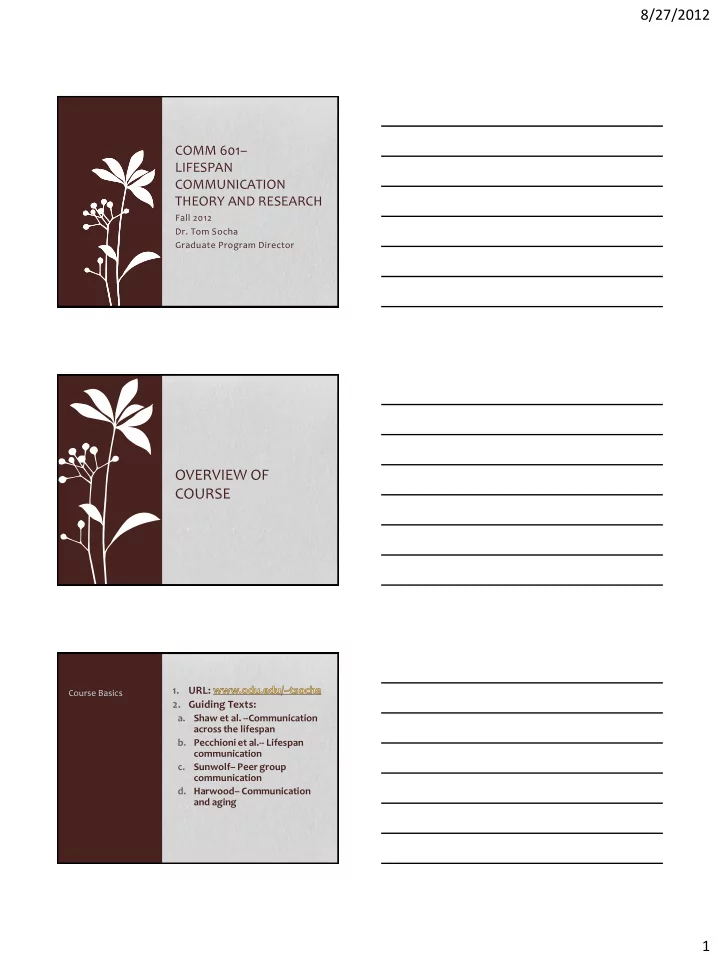

8/27/2012 COMM 601 – LIFESPAN COMMUNICATION THEORY AND RESEARCH Fall 2012 Dr. Tom Socha Graduate Program Director OVERVIEW OF COURSE 1. URL: Course Basics 2. Guiding Texts: a. Shaw et al. --Communication across the lifespan b. Pecchioni et al.-- Lifespan communication c. Sunwolf – Peer group communication d. Harwood – Communication and aging 1
8/27/2012 3. Assignments: Course Basics a. Short papers i. Understudied lifespan communication stages ii. Peer group communication b. Professional development (PDA) i. Curriculum vita ii. Getting to know COMM Professional associations c. Lifespan Communication Development paper d. Midterm Exam e. Final Exam GET ACQUAINTED EXERCISE ASSUMPTIONS OF A LIFESPAN PERSPECTIVE TO COMMUNICATION 2
8/27/2012 1. Nature of Assumptions communication is fundamentally Pecchioni et al (2005, p.10) developmental 2. Comprehensive understanding of communication is dependent on multiple levels of knowledge occurring simultaneously 3. Changes in Assumptions communication can be qualitative and Pecchioni et al quantitative 4. All existing theories can be adapted to a lifespan framework as long as they can be tested 5. Unique methods needed to assess communication changes across the lifespan GENERAL FRAMEWORK FOR LIFESPAN COMMUNICATION: MODEL, ISSUES/QUESTIONS 3
8/27/2012 Transactional, Developmental, Lifespan Birth Death Context: Historical, Relational, Physical, etc. PAST PRESENT FUTURE Defining “Development” Qualities • Global to discrete • Simple to complex • Integration to differentiation • Self-oriented to other-oriented • Dependency to autonomy Major Theory Groups (Salkind, 2004) • Biological • Psychodynamic • Behavioral • Cognitive-Developmental Questions/Issues in Communication Development (adapted from Salkind, 2004, p. 29) 1. What are the major forces that influence the course of communication development? 2. What are the underlying processes that are primarily responsible for changes in communication development (maturation, learning)? 3. What role does age play as a general marker of changes in communication development? 4. Are there critical periods during communication development and if so how are they related to rate of change? 4
8/27/2012 Questions/Issues Continued 5. Is communication development smooth and continuous or do changes occur in abrupt stages? 6. How do theories of communication development explain differences in development between different individuals of the same chronological-age peer-group? 7. What methods are used to study communication development? ECOLOGY OF HUMAN DEVELOPMENT Urie Urie Bronfenbrenner’s Bronfenbrenner’s “Bio - ecological” “Bio - ecological” model model Bronfenbrenner & Bronfenbrenner & Morris (2000) Morris (2000) 5
8/27/2012 Proximal Processes and Communication Development (Bronfenbrenner) • Individual as an active contributor • Activities need to occur on a regular basis, over extend period of time • Activities become more complex over time (must change to continue to spur future changes) • There is reciprocal influence – influencing and influenced by • Interactions with people most important, but also person-object interaction influential • Importance and role of processes changes over time with the individual and the environment 6
Recommend
More recommend